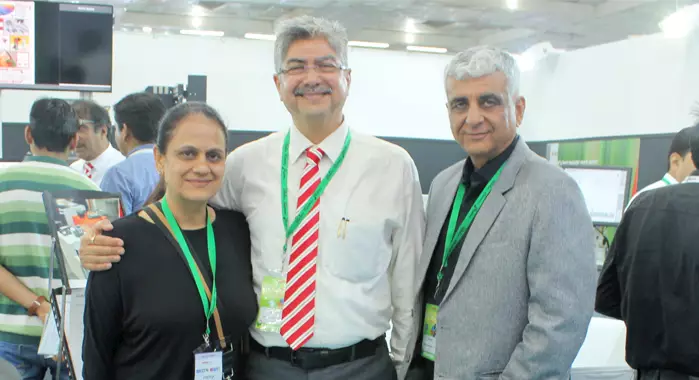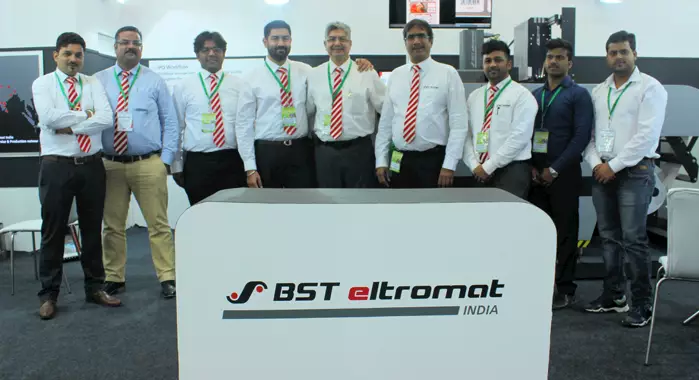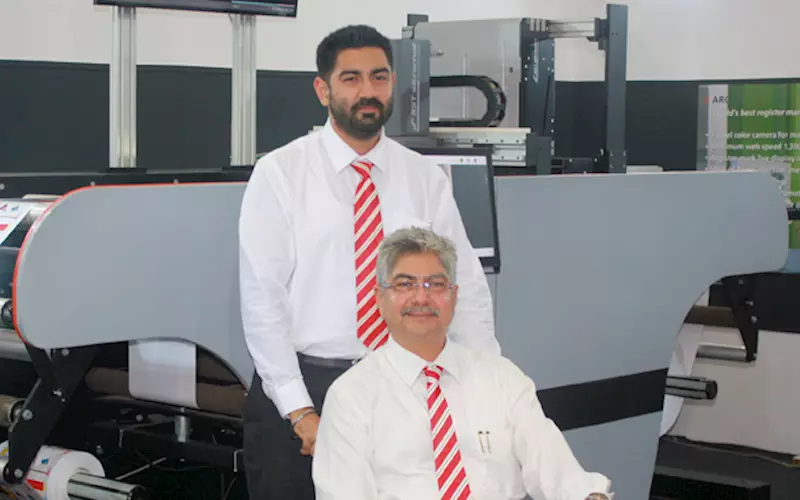Hybrid Technology is the future of 100% Print Inspection
Tappan Patel, managing director, BST eltromat, India shares the details of BST’s acquisition of Eltromat, the new IPQ colour solutions, the trajectory of the company’s rise and why the future is hybrid technology, in a conversation with Ramu Ramanathan
13 Oct 2017 | By Ramu Ramanathan
Ramu Ramanathan (RR): Two to three years ago, eltromat merged with BST ...
Tappan Patel (TP): Yes, we bought one of our biggest competitor Eltromat. It was a huge step. It’s like BMW and Mercedes coming together and creating a global market. As far as technology and business is a concern, nobody in the world is ahead of us. The synergy between both the companies is very good.
RR: Numbers are solid past 12 months?
TP: Our turnover in India for FY 2016-17 was double compared to 2015-16. Generally, one plus one is equal to two, but in synergies like us, it’s more than that.
RR: How so?
TP: BST is well known in narrow-web for its video inspection technology. Even for wide-web, we have the best solution. BST was developing a revolutionary system which would do a combination of 100% inspection with inline photo spectrophotometer. Eltromat was doing a similar thing. We came together and developed the IPQ Centre. We got X-rite as our partner. Together we developed a special camera for in line on the fly colour measurement.
RR: How did this translate in the market?
TP: To give you an example how it works, a well-known convertor installs an ink kitchen which can be integrated with inline spectrophotometer. BST Eltromat has this and we are in discussion with some of the leading convertors. Once it is installed, every recipe will be encapsulated and stored. For example, if you are printing for a brand like Coca-Cola, the printer has to ensure that the consistency of Coco-Cola red is the same from the first to the millionth bottle. How do you ensure that? A tool like inline colour measurement ensures this. Earlier, we used to take a printed sample and hand-held X-Rite spectrophotometer and match the LAB values; today we can do it in line on the fly and at speeds of 600 mts/min.
RR: I see. Is it the first such installation in India?
TP: No. We already have received two orders and both will be installed within the next two months.
For narrow-web, we have partnered with Nyquist Systems and owner of the company Stephan Krebs is a master of what we call the Hybrid technology. Together we are producing world class web inspection systems which could be customised as well.
RR: What is hybrid inspection technology?
TP: We call our hybrid camera TubeScan. TubeScan is the future because in times to come this low-cost systems 100% Print Inspection Camera would be of same quality as line scan inspection systems. We are looking forward to that.
RR: Successful?
TP: Currently in 4 years we have a global installation base of more than 650 systems. That’s a huge success.
RR: When can we see the commercial rollout of the product in India?
TP: We have already installed a couple of systems in India. We had a very successful LMAI Conference in Agra and the product has been very well received. These potential interactions will reflect at Label Expo Brussels 2017. People will come and see how the technology will transform their printing quality. They will be able to see the difference in what they are doing now and what they will be able to do. Hybrid technology uses the skills of matrix camera combined with special prism expertise to let the operator get an overview of complete web width and its repeat. Today we are able to view up to 850 mm of web width.

RR: And the operator on the shop floor sees it in what form?
TP: The operator will be able to see printing defects in real time on an HD monitor. The operator can then view and edit error logs, read the historical data that were recorded before passing the information to the rewinding machine where the defective label/material will be removed and replaced.
RR: The camera lens holds the key?
TP: They are all matrix or area scan cameras but the prism technology in the camera and software make it possible to see the complete web width and its repeat. You also have a choice of installing multiple cameras, depending on the resolution required. If you are inspecting a web width of 850 mm then you may need multiple cameras. We are able to detect defects of up to 0.1mm square which is acceptable for almost 75% of the jobs printed.
RR: How are you set in India, in terms of your size and footprint?
TP: BST eltromat India has over 70% market share for inspection systems and almost 60% for web guides. Unless we reinvent ourselves continuously the market will get saturated. We are also open to acquiring new business if there is synergy with what our core business is, for e.g. we are looking at starting new verticals such as Automation and offering customized solutions to our esteemed customers.
RR: your manufacturing process in India?
TP: As a subsidiary of BST eltromat, International all mechanical components are manufactured in house at our manufacturing facility in Anand, Gujarat. We also do a lot of assembly work to bring down the costs. The rule of our company is to have a centre of manufacturing competence for a particular product is with one country. We got six subsidiaries worldwide which are capable of manufacturing.
RR: Is it tough to cater to the Indian OEMs?
TP: Everything revolves around price in India. For e.g. our basic web video inspection system, PowerScope 5000 is normally installed only on narrow web press in the western world, whereas it’s the most preferred product even for wide web gravures, reason? It’s one of the cheapest inspection system available. European gravure press sells for around € 1.3 million, whereas a similar press in India is available for under half million. It’s very common for European OEMs to offer our top of line inspection system “iPQ” as the standard scope of supply with their press, whereas in India PowerScope or at the most Super Handy Scan 4000 is the norm. From my point of view, a customer can save money and opt for a local printing press and go for the best inspection system. Hopefully, things are going to change in India soon.
RR: For the better?
TP: Yes definitely, things are changing for the better. Products such as web inspection systems and register controls were considered luxury till couple of years ago. The locally manufactured press used to run at maximum speeds of 200 mts/min, but today press speeds have increased to 400 mts/min and register controls and web inspection systems have become essential components of a press.
RR: Is the average printing wastage 6%? How does an efficient inspection system help to bring it down?
TP: The average printing waste can be reduced by 2-2.5% percentage points by using inspection systems like the “iPQ” and register control systems like ARC_18. BST eltromat’s research teams work with world FMCG leaders to understand their requirements. World class products like “iPQ spectral” BST’s in line spectro photometer have been developed to work together with Ink Kitchens which ensure perfect LAB values.
RR: Colour is very tricky? Plus there is the famous three-second rule.
TP: Absolutely. Today, where duplication is everywhere, consistency of colour is important. One of the greatest challenges when printing is reproducing the most precise colour possible or achieving the desired colour quality. The task of colour measurement is to continuously record colour data during the printing process, evaluate them, and issue a warning in the case of relevant deviations from the colour specifications.
Earlier, a printer would normally get a colour chart, where he would have three shades and anything in between was acceptable. Today the printer is asked to download the Pantone shade from the cloud and match the same with very low LAB tolerance.
RR: Please share a bit about your manufacturing site for the benefit of our readers?
TP: We have manufacturing sites in the USA, Germany, India, Brazil, Japan and China. Depending on the competence we may manufacture for us and the rest of the world. We also use our pool of engineers. Everyone knows that Germans do not compromise on quality.
RR: Where are the BST Eltromat sites in India?
TP: Our manufacturing site is in Anand, Gujarat and head office is in Mumbai. We have sales and service offices across the country in cities like Delhi, Kanpur, Bangalore, Chennai, Hyderabad, Kolkatta, Vapi & Pune.
RR: What’s happening in Anand?
TP: All of mechanical manufacturing and assembly. In 2018, we will be celebrating our 25th anniversary.
RR: You said you have 4,000 customers. Which are the segments?
TP: Our customers are in various forms of converting, flexible packaging and in label printing. We enter the scene right from the time film/paper/aluminium foil etc. is produced. We start off with 100% surface inspection and look for defects such as insects, foreign particles, pinholes, dust, gels etc. Our web guides ensure that the parent rolls are properly slit and our thickness measurement sensors ensure uniformity from the beginning of the reel till the very end.
During conversion from plain films/paper to printed reels and labels, our quality assurance cameras and ARC_18 register control systems ensure that the quality of printing is maintained.

RR: What do you think drives your industry?
TP: Food industry is the base of growth. Everything depends on the food industry. If it grows, then the convertors will grow. If convertors grow then film paper/board manufacturers will grow. It is a cycle.
RR: Is the food segment rewarding?
TP: Of course it is. Let’s take the case of Patanjali. This company’s requirement of flexible packaging has grown from 0 to 1500 MT/month within 2 years, at the same time; I don’t believe it has affected the market share of any of their competitor. This means that the demand for flexible packaging is yet to reach its peak. We still have a long way to go.
RR: Consumption patterns have changed.
TP: Today’s economy is driven by the middle class. What I bought around a decade or two ago and what my son can buy today is completely different. Per capita consumption aseptic packaging in a country like Pakistan is 10 times more than it is in India, so we still have miles to go. I am happy that we not bottomed out.
RR: What is happening in printing press manufacturing facilities?
TP: Less than 2 decades ago most of our OEMs had a garage kind of production facility. Today factories of some of the OEMs can challenge some of the best European manufacturing facility. The similar situation is with printers and converters. What they were doing a decade ago and what they are doing now is completely different. Everyone is striving to be better.
RR: What do you attribute the shift? Is it engineering skill?
TP: Both, engineering skills and market’s requirements have improved.
RR: Are the brands pushing converters?
TP: Yes, definitely. Brands are technologically empowered. We have to be a part of the shift as well and have to work with them to sustain growth.
RR: What are the highs and few areas where we can improve?
TP: We are still extremely price driven. Machine manufacturers and accessory suppliers like us get better price realisation even in countries like China, Bangladesh and Pakistan. There is a huge price gap and our purchasing powers cannot be compared with the Chinese, which is why the Europeans OEMs don’t get the joy out of their sale in India. Things have to change.
Rapid fire questions
Great feedback from customer?
BST eltromat is a true market leader. Products are world class and they are backed up by excellent after sales service.
Three favourite BST Eltromat products for India
ARC_18 register control system, CLS Pro for slitting machines and PowerScope 5000. They are our bread & butter systems.
IPQ inspection system is catching up and people understand the importance of better technology. Though expensive, it’s worth the investment. It’s the State of the Art, user-friendly and service backup is good.
Advice to a new entrant in the industry, especially a student
I look for positive attitude in a candidate. Rest we can teach. Because of your right attitude, things will fall in the place. I am a science graduate with major in fishery, nothing to do with engineering or with the printing & packaging industry. My son has graduated in hospitality and tourism from Switzerland, yet we are fairly successful.
Ten years down the line
We are lucky to be where we are. We have miles to go. It’s a continuous process of educating and evolving yourself. This country is the best place to live in.
Tappan Patel on himself
I was born in Mumbai, schooled in Mumbai and graduated from Hyderabad. I came from a reasonably affluent family, but lost my parents before I was 14. I started my career selling door to door vacuum cleaners & water purifiers with Eureka Forbes. I am credited to have sold India’s first Aqua guard.
To be successful, surround yourself with people who are more intelligent than you. All the members of my team is more intelligent than me. I may know most of the things, but they are the experts. They drive the company, I do not. The moment you think nothing will move without you, your growth stops. Hire the best and do and let them do what they are best at. My job is to set standards and goals.











 See All
See All